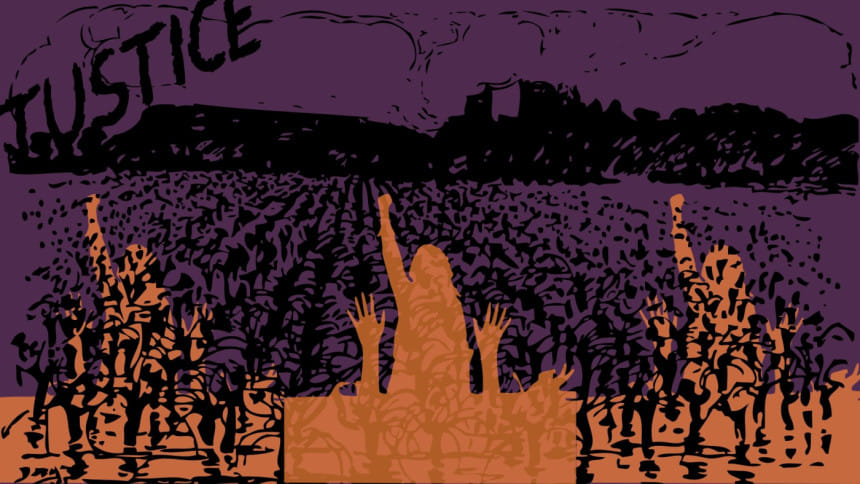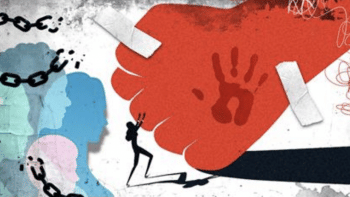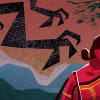Dismantling rural gender-based violence requires more than awareness

Imagine living each day in a shadow of fear. Your every movement calculated, your voice hushed, your dreams suffocated by the constant threat of violence. For nearly 93 out of every 100 women in rural Bangladesh, this is not a hypothetical scenario—it is their brutal reality.
In the lush, green landscapes away from the chaos of the metropolitans–that might appear serene from a distance– a devastating crisis pulses beneath the surface. It is a crisis etched into the lives of women and girls, carved by systemic violence that threatens to crush their spirit, their potential, and their very humanity. This is not just a statistic—this is a profound human rights emergency that demands our immediate and uncompromising attention.
A groundbreaking 2023 meta-analysis by UNFPA, UNICEF, and UN Women has unveiled a truth so stark it demands a collective moral reckoning: 93 percent of women in Bangladesh have either experienced violence themselves or know another woman who has suffered gender-based violence. In rural areas, this crisis is not just a problem—it is a predatory system that traps women in a cycle of abuse, fear, and systemic neglect.
The journey to justice for rural survivors is fraught with insurmountable challenges. Institutional inadequacies plague the system, with rural areas suffering from a critical lack of trained law enforcement and judicial personnel capable of handling sensitive cases. Many police stations are ill-equipped to process complaints, with officers often displaying bias or indifference. Social stigma further compounds the problem, as community norms frequently normalise domestic violence, discouraging women from reporting abuse. The fear of social ostracism and potential retaliation silences many survivors.
Legal access remains a distant dream for most rural women. With few female lawyers and minimal legal aid services in rural regions, survivors face significant barriers in seeking recourse. The nearest specialised courts are often hundreds of kilometres away, making legal pursuit financially and logistically impossible for many.
The Covid pandemic has catastrophically exacerbated these challenges. During lockdown periods, reported incidents of violence against women (aged 18-49) increased by nearly 70 percent, with many experiencing abuse for the first time. Rural women, already marginalised, became even more vulnerable during this period.
The current infrastructure for survivor support is woefully inadequate. According to a 2020 Human Rights Watch report, only an estimated 21 government-run shelters and 15 nongovernmental organisation-run shelters exist for over eight crore women and 6.4 crore children. Most shelters have strict eligibility criteria, excluding many desperate survivors. Short-term shelters typically allow stays of just a few days, and no comprehensive witness protection mechanisms exist.
The One Stop Crisis (OCC), initially conceived as a comprehensive solution to support survivors of gender-based violence, reveals the stark gaps in support infrastructure. While these centres were designed to provide integrated services—including medical care, legal support, counselling, and safe shelter—their implementation in rural areas exposes critical systemic failures.
As of 2023, Bangladesh has established approximately 81 OCCs nationwide, with 67 operating at district- and upazila-level hospitals. However, the reality of these centres falls far short of their intended purpose. Rural OCCs are chronically understaffed, with many operating without full-time specialised personnel trained in gender-based violence response. Medical professionals often lack comprehensive training in trauma-informed care, and the centres frequently suffer from a wide range of issues, including severe resource constraints, inadequate privacy protections, limited psychological support services, and inconsistent documentation and follow-up mechanisms.
The geographic distribution of these centres further compounds the challenge. In vast rural regions, a single OCC might serve hundreds of thousands of people, making access a significant hurdle. Transportation costs, social stigma, and fear of community backlash prevent many survivors from reaching these limited support points.
Moreover, the centres often operate within a patriarchal framework that inadvertently perpetuates the very power dynamics they aim to dismantle. Survivor testimonies highlight instances where centre staff prioritise family reconciliation over individual safety, effectively invalidating the experiences of women seeking protection. Many survivors report experiencing secondary trauma during their interactions, with staff displaying insensitive attitudes or creating additional barriers to seeking justice.
Technological integration remains minimal. Most rural OCCs lack robust case management systems, digital reporting mechanisms, or confidential tracking of support services. This technological gap means that many cases fall through the cracks, with limited accountability and minimal long-term support for survivors.
Addressing this critical issue demands a multi-faceted approach. Comprehensive training programmes must be implemented, providing mandatory sensitivity training for police, judiciary, and healthcare workers. Specialised GBV response units should be developed in rural police stations, with regular workshops on trauma-informed approaches.
Community-based interventions are equally crucial. Grassroots awareness campaigns must challenge harmful social norms, engaging local religious and community leaders in anti-violence initiatives. School-based education programmes on consent, gender equality, and personal rights can help transform generational attitudes.
Legal and institutional reforms are imperative. Mobile legal aid clinics must be established in rural areas, accompanied by a centralised, accessible case management system. Strict accountability measures should be implemented for law enforcement handling GBV cases.
Support infrastructure requires significant enhancement. The government must increase shelters with flexible, survivor-friendly policies, develop a robust witness protection framework, and create economic rehabilitation programmes for survivors. Technology can play a pivotal role, in confidential reporting mechanisms, multilingual helplines, and remote counselling services.
The fight against gender-based violence in rural Bangladesh is not just a legal challenge—it needs a profound social transformation. It requires unwavering commitment from government institutions, civil society, community leaders, and all citizens. We cannot continue to accept a status quo where 93 percent of women in the country experience violence, and where justice remains an elusive dream for survivors. The time for comprehensive, compassionate, and decisive action is now.
Mahiya Tabassum is a writer and journalist at The Daily Star. She can be reached at [email protected].
Views expressed in this article are the author's own.
Follow The Daily Star Opinion on Facebook for the latest opinions, commentaries and analyses by experts and professionals. To contribute your article or letter to The Daily Star Opinion, see our guidelines for submission.

 For all latest news, follow The Daily Star's Google News channel.
For all latest news, follow The Daily Star's Google News channel. 











Comments